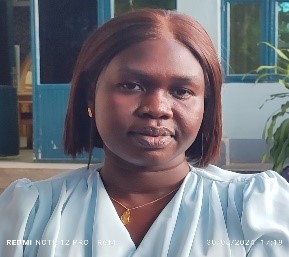Nyachuol Chuol Gai, 30, studied in Sudan from kindergarten to high school. She then pursued a bachelor’s degree in accounting and finance at Cavendish University Uganda, until December 2014.
Gai currently works as head of internal audit at Nilepet, the petroleum corporation owned by South Sudan’s government. She has been in the position since 2017.
Gai is an alumna of the Mandela Washington Fellowship of 2022, one of the many flagship programs of the U.S. State Department. She says that during her time in America, she saw many things that South Sudan could adopt.
“The world is changing rapidly in education, innovation, and research; we really need to wake up and catch up,” she says.
In addition to her public assignment, Gai has a personal business that she has been running since 2018, providing cleaning services to public and private institutions in South Sudan.
“I have been running it since 2018. I now have 25 women working for me. I provide services to the private sector and government institutions,” she says.
Gai is currently the chairperson of the National Flood Response Youth Corps (NFRYC), a voluntary youth network of organizations that monitors the flood situation in South Sudan.
She says she decided to come up with the initiative because she comes from one of the areas most affected by floods. Her village, she says, has a history of flooding.
Given the impact of floods in 2020 and 2022, she saw the alert and notification from South Sudan’s Ministry of Water Resources and Irrigation in May [2024] about the imminent danger issued by IGAD and decided to act.
She came up with something that would help her people and other communities. Highly motivated youth joined her and are now part of the national taskforce and, with partners, are making a great impact.
Gai recalls her long public life, beginning with her first job with the International Republican Institute (IRI) after the South Sudan crisis in 2014. She worked in various places before joining NilePet.
On the challenges she faces in public life, Gai says she has been disrespected many times because she has a small body. Further, many men in South Sudan think an unmarried woman does not need a job.
“Our people think that when you are not married, you are not supposed to get a job. My physical look is also another challenge. My body looks smaller, and many people think I do not deserve a management position. I can testify to being undermined deliberately because I am female. However, I have not faced other challenges like sexual harassment,” she explains.
On where she thinks she would be today in different circumstances, Gai gives credit to her parents, who mentored her to become a good citizen. Her father played an influential role in preparing her for public service.
“I was taught this by my father. I remember when I was young—I do not know the exact year, but it was when Tabitha Boutros was made Sudan’s Health Minister. My father would talk to me whenever she was featured on the evening news, urging me to study hard to be like Boutros.
“‘She is holding a big position because of education; look up to her,’” she recalls her father saying, adding that she was privileged to be in a family that motivated children to pursue education.
Tabitha Boutros was Sudan’s first Federal Minister for Health after the formation of the interim government of national unity in 2006. That followed the Comprehensive Peace Agreement signed in 2005 to end 22 years of brutal conflict in Sudan. She was known for openly speaking about issues prohibited by Islamic doctrines, such as the use of condoms by young people to combat HIV/AIDS, which was considered taboo by the ruling National Congress Party.
Gai is living a happy life because she is able to support herself and her family, and most importantly, she has sustained a good legacy by helping mentor young girls to become better citizens and live a better future.
“I thank God that I have achieved so much. I am thankful that I am taking care of myself, my family, and I am able to help my community and mentor the younger generations,” she says.
To the girls, Gai says they should not give up despite the challenges. To the parents who force girls into marriage, she warns that they will not be alive forever. They will grow old and leave their daughters suffering miserable marital lives with no education.
Gai calls upon men to stop domestic violence, saying there is no justification whatsoever. She feels her knowledge and skills on gender equity and social inclusion have encouraged her to work more on community service and to provide civic education to girls.




